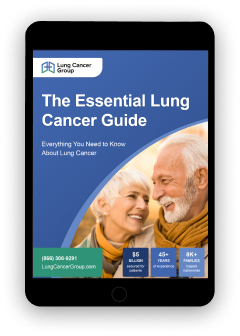Lung Cancer Survivors
While lung cancer is aggressive, you could survive for many years or even decades after being diagnosed. If this happens, you’ll be considered a lung cancer survivor. Some of the longest lung cancer survivors have lived for 20 years or more. Read lung cancer survivor stories and find out factors that affect your chances of living longer.
Can You Survive Lung Cancer?
 Possibly, yes. You may be able to survive lung cancer by getting treatment to remove and shrink tumors. How long each person will live after a lung cancer diagnosis is different. However, some long-term survivors are alive over 20 years later.
Possibly, yes. You may be able to survive lung cancer by getting treatment to remove and shrink tumors. How long each person will live after a lung cancer diagnosis is different. However, some long-term survivors are alive over 20 years later.
It’s more likely that you’ll become a survivor if you are younger, diagnosed with early-stage cancer, and agree to aggressive treatments like surgery. You could still live a long time even if you’re older or have late-stage lung cancer with medical care, though.
Trying to find and afford the right treatments to survive lung cancer can be overwhelming, but Lung Cancer Group is here to help.
Get a Free Lung Cancer Guide to explore treatment options, ways to access financial compensation to cover costs, and hear stories from other lung cancer survivors.

- Understand risk factors
- Find top treatments
- Pursue compensation



Lung Cancer Survivor Stories
There are many people living full, rich lives today despite a lung cancer diagnosis. Hearing from these survivors can help you stay hopeful as you navigate your own diagnosis.
Some lung cancer survivor stories include:
- Brandi was diagnosed with advanced lung cancer in 2018. After getting chemotherapy, immunotherapy, radiation, and targeted therapy, her scans were clear. She has remained in remission, where there are no signs of cancer, for nearly a decade.
- David decided to get surgery after his lung cancer diagnosis, and has lived for over 20 years since then. He has become a dedicated advocate for lung cancer research.
- Emily was diagnosed with stage 4 lung cancer at just 28 years old. She has survived for more than 10 years.
- Jim is a lung cancer survivor diagnosed in 2005 who also has asbestosis. He has lived for 20 years with the help of treatment, giving him time to see his daughters grow up.
“Lung cancer has a way of changing not only your perspective. It changes the entirety of your life. You learn quickly that each minute is precious, that every hug is to be enjoyed, and every breath is an ‘extra’ in the overall scope of life.”
— Jim, 20+ year lung cancer survivor
The common thread with all of these lung cancer survivors is that they got treatment. If you’re worried about finding and affording care that could help you, contact us today. You may qualify for compensation to cover the costs of lung cancer treatments.
Factors That Affect Lung Cancer Survival


Various factors affect how long you may live with lung cancer. This includes your overall health, age, your type and stage of lung cancer, and how the cancer responds to treatment.
Learn about each factor influencing lung cancer survival below.
![]() Early Detection
Early Detection
Lung cancer has four stages, and if you are diagnosed in an earlier stage, your cancer will likely be easier to treat. This means you could have a better chance of living longer.
Lung cancer screening tests are crucial to catching cancer early on. These are special scans recommended for people who are at risk of lung cancer, even if they are not experiencing any symptoms. If you are a current or former smoker, ask your cancer care team about getting screened regularly.
![]() Overall Health at Time of Diagnosis
Overall Health at Time of Diagnosis
If you are in generally good health outside of having cancer when you’re diagnosed, it may be easier for your body to recover from treatments. You also may have a lower risk of complications. Both of these play a big role in helping you live longer.
![]() Patient Age
Patient Age
Many lung cancer patients are older adults. However, if you are younger, you may have a better chance of long-term survival. This is because it’s more likely that you can safely undergo aggressive treatments like surgery.
![]() Type of Lung Cancer
Type of Lung Cancer
There are two main types of lung cancer. The most common type is non-small cell lung cancer (NSCLC) and it is easier for doctors to treat. Because of this, you are more likely to become a long-term survivor if you have NSCLC. The overall 5-year survival rate for NSCLC is 32%, according to the American Cancer Society (ACS).
Small cell lung cancer (SCLC) is a less common type and is harder to treat. According to the ACS, the 5-year survival rate for SCLC is 9%. Still, you may be able to live a long time with SCLC if you get treatment.
What Remission Means for Lung Cancer Survivors
Lung cancer remission means that the signs and symptoms of your lung cancer are significantly reduced or gone completely. When you are in complete remission, meaning there is no cancer at all, you have a better chance of becoming a long-term survivor.
However, you will still need to see your doctors regularly for routine screenings even while in remission. This is because many cases of lung cancer do come back, sometimes after decades. When this happens, it’s known as a recurrence.
While it can be shocking and overwhelming to know that your cancer has returned, you can work with your oncologists (cancer doctors) to come up with a new treatment plan. You may be able to go into remission again and live a long time.
Get a Free Lung Cancer Guide to explore treatments that could help you enter remission and become a survivor.



- Understand risk factors
- Find top treatments
- Pursue compensation



Improving Your Chances of Becoming a Lung Cancer Survivor
While everyone’s journey with lung cancer is different, there are some steps you can take to put your health into your own hands and try to live as long as possible.
1. Find the Best Doctors and Treatments
First, you need to find the right lung cancer doctor. Oncology specialists can create personalized care plans, help you manage side effects of treatments like chemotherapy, and make adjustments as needed.
The right doctor can also see if you are eligible for new lung cancer treatments such as those available through clinical trials. These therapies may help you become a survivor even if your cancer doesn’t respond to standard treatments.
2. Seek a Second Opinion
Because lung cancer symptoms often get mistaken for less serious conditions, general doctors may make the wrong diagnosis at first. That’s why you should get a second opinion from a specialist.
An oncologist can order additional blood biomarker tests, biopsies, and X-rays to ensure you have an accurate lung cancer diagnosis. They can also confirm that you have the right course of treatment.
3. Find Emotional Support and Resources
A lung cancer diagnosis can be stressful and scary. Seeking emotional support and resources can help you maintain a positive outlook and improve your quality of life.
You can join online support groups, attend in-person lung cancer support groups, or talk to a licensed counselor. In some cases, you may find out what’s helped other patients that could be useful in your case.
Get Help Becoming a Lung Cancer Survivor
Dealing with lung cancer is never easy, but with the right treatments and care team by your side, you could potentially live much longer than expected. Even some patients who have been given just months to live have gone on to live for 20 years or more, becoming long-term lung cancer survivors.
Lung Cancer Group is here to help you and your family after a diagnosis.
Work with our team to:
- Explore top doctors and treatments
- Find options to afford medical expenses
- Receive the support and advice you deserve
Call (877) 446-5767 or get a Free Lung Cancer Guide to hear from other lung cancer survivors and find tips on navigating life with this cancer.
Lung Cancer Survivor FAQs
Are there survivors of lung cancer?
Yes, there are survivors of lung cancer. While having lung cancer is serious, some patients have lived for 20 years or more, even in late stages.
The best way to become a lung cancer survivor is to seek prompt treatment from experienced doctors. Different therapies can remove or destroy as much of the cancer as possible, allowing you to potentially live longer.
Can you fully recover from lung cancer?
While there’s no universal cure for lung cancer, it may be possible to make a full recovery. After treatment, doctors may say you are in remission, meaning there is no cancer seen in your body.
Lung cancer can come back (recur) after treatment. Still, some patients have lived for decades without dealing with cancer again.
Get a Free Lung Cancer Guide to explore treatments that could allow you to recover from lung cancer.
Does anyone beat stage 4 cancer?
Some people do beat stage 4 lung cancer, becoming survivors in the process. For example, Ed has lived for nearly 15 years since his stage 4 lung cancer diagnosis in 2012.
Given originally just a year or less to live, doctors were able to recommend treatments that stopped Ed’s cancer from getting worse. “We are living long lives now, long fruitful lives where we can enjoy being with our family,” Ed says today.
Can you live a long life after lung cancer?
It is possible to live a long, active life after lung cancer, even if surgeons have removed all or part of a lung. Talk to your health care team to learn more about what activities you can and can’t do as a lung cancer survivor.
Lung cancer support groups can also help you cope with the emotional impact that a diagnosis causes, making you feel less alone and more secure.
Can you live 20 years with lung cancer?
Possibly, yes. If doctors catch and treat your lung cancer while it is in its early stages, you may be able to live for another 20 years.
Mount Sinai Hospital found that 80% patients with early-stage lung cancer live for 20 years or more. The key was that these patients received CT scans and got prompt care. Even late-stage patients can live for decades in some cases.
Who are some lung cancer stage 3 survivors?
Terri has lived for more than 20 years following her stage 3 lung cancer diagnosis in 2003. Originally, doctors told her there was no way she could get surgery, and her prognosis was considered terminal.
However, Terri did end up getting surgery and other treatments, and is still alive today — proving that anything is possible, even if your cancer is advanced.
Michael is another stage 3 lung cancer survivor. He’s lived for nearly 10 years thanks to treatments like surgery, radiation, and chemotherapy.
Call (877) 446-5767 for help affording and finding treatments that could allow you to become a lung cancer survivor.

